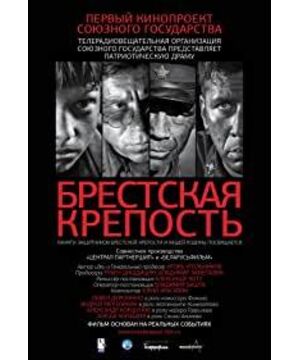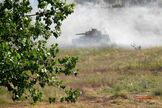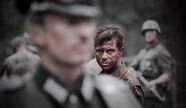Compared with the relatively simple plot, the group of people portrayed in the film is undoubtedly more dazzling:
a couple, after each shot the bullet in the pistol, at the same time revealing the determination not to be a prisoner, the husband uses only what is left. With two bullets, he asked his wife to visit the window for an excuse, and then shot him behind the back. Finally, he shot himself in his chin, calmly and calmly, without fear or regret, without a trace of compassion or hesitation.
A veteran military officer who had been demoted and had experienced two wars was the first to realize the imminent life and death crisis through experience and intuition. At the critical moment when the war broke out and his comrades fled, he bravely stood up and assumed his own temporary command. Form a strong combat unit until the ammunition is exhausted.
A fat lieutenant with an optimistic nature, who looked like Martha, but was extremely agile. He led his troops to fight for the first time. At the most tense moment of the stalemate on the battlefield, he cooperated with his comrades tacitly and saw through and killed the German spies who had sneaked in. When his combat unit was almost exhausted, he improvised the dance rehearsed a few days ago to cheer up his comrades, and finally died in a sitting position, with his eyes wide open.
An Israeli regiment political commissar took the initiative to provoke the commander-in-chief in the chaotic battle, quickly organized the officers and soldiers, and commanded them in an orderly manner. At the critical moment when the cunning German army used the wounded and sick as cannon fodder to force an offensive, he was calm and witty and alone. Facing the enemy's battlefield, the danger was turned to end, and the enemy's attempts were dismantled. Even if the ammunition was exhausted, the will to resist was never shaken.
A pair of young brothers, the elder brother used only one cannon to destroy two German tanks one after another, saving the resistance from the disaster, and finally was shot dead by the gunfire of a third German tank. The younger brother is just a bugler, but he has repeatedly sought war, shuttled back and forth in the chaotic artillery fire, passed information, transported water, and eventually became a survivor of the war. This pair of brothers undoubtedly has a strong symbolic meaning, one representing the ideal of wishing the Soviet Union to be stronger, and one representing the immortality of the Soviet nation.
All these ordinary Soviets, at the juncture of the invasion of the powerful enemy, the disparity in power, and the danger of the national fortune, fought one after another, and died one after another on the battlefield. They are heroes, and they are honored to be defeated. There is almost no preaching and spirit in the film, but there is such a detail: the German army uses a tweeter to persuade you to surrender, saying that we have no intention to conquer you, but to rescue you from centralized rule and collective farms. In response, a Soviet officer told his comrades that they wanted us to live a life of humiliation. This seemingly ordinary sentence is the soul of this movie. Unwilling to give in is the eternal gene of the Russian nation.
Not long ago, I read Mr. Zi Zhongyun's self-selected works. One of the long articles recalled the humiliation suffered by the Republic of China diplomat Mr. Gu Weijun at the Dumbarton Oaks Conference in 1944. After reading it, he couldn't help being too long. China is nominally among the four major powers of the Allies, but when discussing post-war arrangements, the representatives of the Soviet Union resolutely disagreed with China for a meeting (Stalin believed that neither China nor France were qualified). The host, the United States, devised several workarounds, which were ultimately rejected by the Soviet Union. Read it, mixed with incomprehension in anger. After watching this film, it seems that there is an additional angle of understanding. Compared with the Soviets' preference for death, tooth for tooth, and final conquering of their opponents, Kuomintang China's performance in the entire World War II was too bad. First, it was too indifferent, and then too passive to avoid war, too bloodless, and too unable to reassure its allies. The Soviets apparently believed that sitting at a conference table with such a so-called "victorious nation" to discuss the future of the world was simply an insult to themselves.
Recently, a friend who is familiar with military affairs said that the War to Resist US Aggression and Aid Korea was simply a letter of nomination presented by Mao Zedong to Stalin. Combined with my own historical reading, I particularly agree with this unique analysis and judgment. On the stage of the last two hundred years of world war, no nation can have the confidence of Russia. The three most fierce nations in the world, France, Germany, and Japan, have all caused huge trauma to Russia, but without exception, they all became Russia's defeaters in the end. Especially in the Pacific battlefield at the end of World War II, the exhausted Anglo-American forces could not fight anymore and had to repeatedly request the Soviet Union to fight against the soldiers. After taking a lot of effort and setting the score, the Soviet Red Army swept the Japanese Kwantung Army, which had been talked about by the Chinese army in autumn. A nation that relies on its fists and will to play its prestige and status, and a nation that basically hangs a red light on another foreign war report card, there is no need to conceal the contempt in its bones. Faced with the strong intervention of the United States in the Korean War, the Soviet Union said to China, anyway, I will not fight, and I cannot support you clearly to avoid suspicion. Fortunately, China at that time had Mao Zedong, a Chinese German. Millions of Chinese soldiers defended the dignity of the nation with great sacrifices, and finally won the trust of the Soviet Union and later, the most precious support in the early days of the founding of the People's Republic of China.
The writer Ye Zhaoyan visited Russia in his early years and talked about World War II with an old Soviet aunt. The old lady said that we killed 20 million people. Ye said that 20 million people died in China. The old lady said straightforwardly: Our 20 million people were killed in battle, and most of you were slaughtered. The words of an ordinary old lady deeply hurt our writer. It is a pity that similar rational reflections and sharp pursuits are more or less suppressed, and people who are not very forgetful are expected to see them. In the recently hit "Zhen Huan", the language style of the Dream of Red Mansions is indeed refreshing, but it is said that the details and skills of the court battle are the most popular among the audience, and even some audiences regard it as a treasure of career promotion. Indeed, speaking of internal fighting, our Chinese nation can be said to have a long history; and speaking of foreign wars, apart from the contemporary anti-US aggression and aid Korea, only Emperor Wu of the Han defeated the Xiongnu nearly two thousand years ago. What’s even more frightening is that business with the old and the United States has gone smoothly over the past few decades, and even the resistance to US aggression and aid to Korea has been reluctant to mention it. Until the younger generation with a serious lack of background knowledge has already questioned: sacrifice a million soldiers to help a small gangster fight a big one. Rogue, is it a good deal?
All the truths of human history in history, "Animal World" has already been fully explained. Say a thousand, say ten thousand, can't fight, dare not fight, can't win, no matter how fat he is, no matter how glamorous he looks, no matter how good he feels, there is nothing better than a knife. Russia’s national power is declining to the point where it has to sell resources to protect itself, but the fierce people of the world still have to keep awe of it. On the other hand, China’s economy is booming and has become the world’s locomotive, but not only the old Western powers, but even the small Southeast Asian countries. I dare to shake my fist and brighten my fangs at you from time to time. What's the reason? In a word, in the war record book, the disparity in the scores of the two great powers is really too big. Jingwu will win, and if you forget the battle, you will die. Let history tell the future, will China have another so-called golden opportunity for development?
View more about Fortress of War reviews











